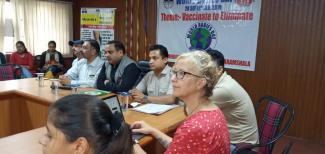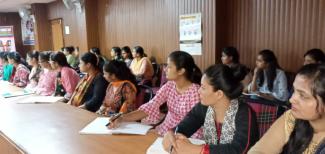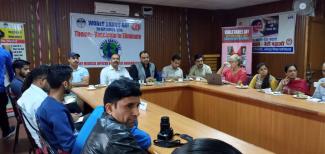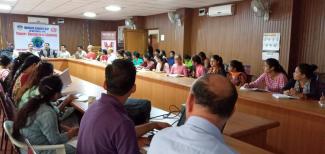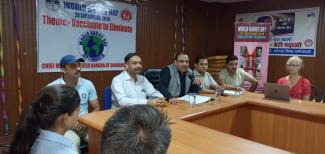
An inter-sectoral workshop was organized at conference hall of Zonal Hospital under the aegis of Health department to observe World Rabies Day 2019 under the chairmanship of District Health Officer Dr Rajesh Guleri. Dr Guleri stated that this marks the death anniversary of Louis Pasteur French chemist and microbiologist who developed the first rabies vaccine. The goal is to eliminate deaths due to dog bites rabies by 2030. He shared that we need to curtail dog population through large scale sterlisation, decease interaction and making it safe, better solid waste management at municipal level attracts stray dogs, and licensure of pets.
Dr Rajesh K Sood Epidemiologist cum District Programme Officer stated that Rabies is dangerous disease caused by a virus, Around the world, it kills 59,000 humans and millions of animals each year, approximately 80% of cases occur in rural areas, around 40% of cases occur in children under the age of 15.
The frequency of human rabies deaths is 1 case every 30 minutes, Animal bite incidence rate is 17.4 per 1000 population. People and animals get rabies if they get bitten or scratched by an animal that has rabies. Rabies virus is carried in the saliva of an animal that has rabies. Rabies virus travels from the wound along the nerves to spinal cord and brain. If a person or animal get rabies, he will almost always die from it. There are only 4 survivors who recovered following intensive life support.
Although it is fatal, rabies is preventable through three pillars: Awareness of rabies disease, and what to do in case of a bite; Access to timely, affordable post-exposure prophylaxis (PEP) for people; and Mass dog vaccination to prevent disease at its source. The WHO 2018 guidelines have been developed with research contributions from Padamshree Dr Omesh Bharti, which have led to cost reduction, Dr Rajesh Guleri stated on the occasion.
He shared that treatment is by wound wash and treatment, administration of vaccines and immunoglobulins. The first aid is to wash all wounds under running water for 15 minutes is most effective. Do not apply any local applicants like chilli powder, turmeric, neem, plant juices etc as their irritation speeds virus movement along the nerve, he added. Patients deaths have been who did not complete the vaccination, and went to faith healers instead.
Infectious Rabies Virus has not been isolated from the milk of rabid cows, and no human rabies cases have been attributed to consumption of raw milk. Although drinking raw milk from a rabid animal is not advised, there is no evidence that this results in exposure to Rabies virus, and PEP is not advised. Milk that has been pasteurized presents no risk for Rabies virus transmission.
Dr Gurmeet Katoch, District Programme Officer shared that similar events were held in all blocks of the district to raise awareness, and called upon media to disseminate the right message. Media personnel, Hospital staff, Participants from Education Department, Community Health Officers trainees also participated in this workshop.
Dr Abhishek Veterniary Medical Officer, shared tips on avoiding bites. These include do not play with animals unless you are with an adult. Do not stare at or provoke any animal. Do not chase a dog or throw stones at them. Do not run if a dog chases you, instead stand still and call for help. Do not tease a dog even if it is your pet. If a dog attacks you then curl yourself and protect your face, be still and call for help. Adults must supervise all animal - kid interactions. Do not give the animals hugs or kisses. Do not use aggressive punishment with the dog. Put the pet dog in his cell with its favorite toy to chew when there is a gathering at the home. Avoid stray dogs, cats and wild animals. Never try to feed or approach a stray / wild animal. Be careful of pets that you do not know. If any animal is acting strangely, always tell the elders. He shared that people should vaccinate animals/ pets. Rabid dog will not be pack, has excessive salivation and red eyes.
Deb Jerret founder Dharamshala Animal Rescue NGO shared that dumb rabies is quite common in Dharamshala. They see about 2 rabid dogs per month. Participants shared that people still go to faith healers. In order to have one health, we need to work with both humans and animals. The NGO is working on get adoption for schools, education in schools to handle animals safely, humane dog population management. They work with population control, keeping them healthy and vaccinated twice a week.
Event images
